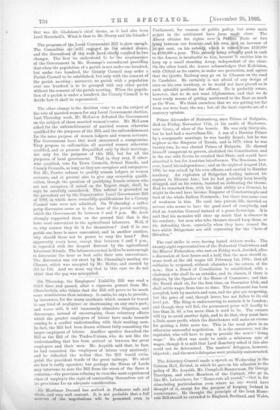The coal strike is over, having lasted sixteen weeks. The
twenty-eight representatives of the Federated Coalowners and the Miners' Federation, who met on Friday week, decided, after a discussion of four hours and a half, that the men should re- sume work at the old wages till February 1st, 1894; that all collieries be reopened, without obstacles to the return of the men; that a Board of Conciliation be established, with a chairman who shall be an outsider, and be chosen, if there is dispute, by the Speaker of the House of Commons ; and that the Board shall sit, for the first time, on December 13th, and shall settle wages from time to time. The settlement has been accepted, both by masters and men, and the pits are reopening, but the price of coal, though lower, has not fallen to its old level yet. The Ring is endeavouring to sustain it in London ; and though they will fail, the permanent price will hardly be less than 2s. 6d. a ton more than it used to be. The owners will try to avoid another fight, and to do that, they must have a little more profit, which the distributors will make an excuse for getting a little more too. This is the weak place in an otherwise successful negotiation. It is the consumer, not the capitalist, who will have to pay to provide the men's " living wage." No effort was made to settle a minimum rate of wages, though it is said that Lord Rosebery asked if this also could not be determined. The masters' delegates, however, objected ; and the men's delegates were probably uninstructed.






































 Previous page
Previous page